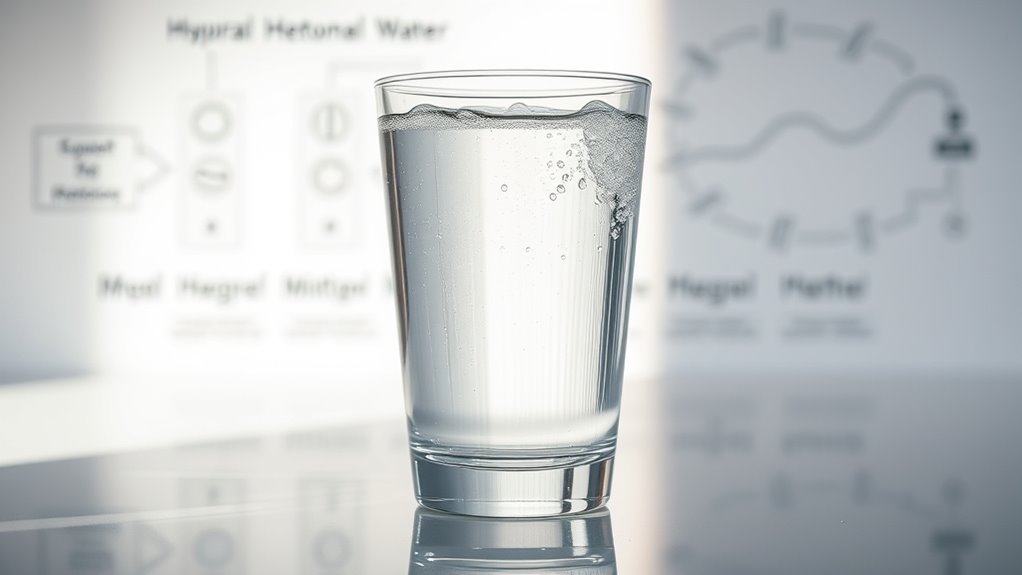Staying well-hydrated boosts your metabolism by increasing energy expenditure, mainly through water-induced thermogenesis that uses fat for fuel. Proper hydration also supports insulin sensitivity, manages hormone levels, and helps regulate glucose, reducing metabolic stress. Drinking water enhances fat breakdown (lipolysis) and influences hormones like vasopressin that affect metabolic health. Knowing how hydration fuels your body’s processes can help optimize your metabolic efficiency—keep exploring to uncover more ways water supports your health.
Key Takeaways
- Adequate hydration boosts metabolic rate by about 30%, primarily through water-induced thermogenesis and lipolysis activation.
- Proper hydration enhances insulin sensitivity and glucose regulation while preventing dehydration-related hormonal imbalances.
- Drinking water promotes fat breakdown by stimulating sympathetic nervous system activity, supporting weight management.
- Hydration maintains kidney and hormonal function, facilitating metabolic processes and waste elimination.
- Adequate water intake reduces serum osmolality and vasopressin levels, lowering metabolic stress and associated disease risks.
How Drinking Water Boosts Your Resting Metabolic Rate

Drinking water can effectively boost your resting metabolic rate (RMR), helping your body burn more calories even when you’re at rest. When you consume about 500 ml of water, your metabolic rate can increase by roughly 30% within just 10 minutes, peaking around 30-40 minutes. This thermogenic response adds about 100 kJ of energy expenditure. Drinking 2 liters daily could raise your total energy burn by approximately 400 kJ. The effect lasts for over 90 minutes, partly because your body warms the water from room temperature to core temperature—about 40% of the boost. Water consumption stimulates sympathetic activity and thermogenesis, which helps increase calorie burning without extra effort. Proper hydration is essential for maintaining metabolic health and ensuring your body functions optimally. Keep in mind, individual responses vary, but regular hydration can support a faster metabolism. Incorporating healthy hydration habits can further enhance overall metabolic health and efficiency, especially when combined with other lifestyle practices. Additionally, maintaining proper hydration can support metabolic processes crucial for weight management and overall health.
Hydration’s Role in Regulating Glucose and Insulin Sensitivity

Keeping yourself well-hydrated can markedly influence how your body responds to glucose and insulin. When you’re dehydrated, your blood sugar levels tend to rise, and insulin becomes less effective. Drinking enough water helps maintain proper glucose regulation and improves your body’s sensitivity to insulin. Additionally, hydration status can impact overall metabolic efficiency, affecting energy expenditure and nutrient processing. Proper hydration also supports metabolic pathways that may indirectly influence metabolic health.
Water and Insulin Response
Have you ever wondered how hydration influences your body’s ability to regulate blood sugar and respond to insulin? When you’re well-hydrated, your body’s insulin response improves, reducing resistance. Dehydration raises vasopressin levels, which can hinder insulin’s effectiveness and promote fat storage. Proper hydration helps balance hormones, lowering the risk of metabolic issues.
Consider this emotional impact:
| Hydrated State | Insulin Response | Metabolic Effect |
|---|---|---|
| Well-hydrated | Efficient glucose regulation | Better energy levels |
| Dehydrated | Increased insulin resistance | Fat storage risk |
| Adequate Water Intake | Improved sensitivity | Reduced disease risk |
| Chronic dehydration | Hormonal imbalance | Metabolic dysfunction |
| Hydration & health | Prime insulin functioning | Enhanced vitality |
Staying hydrated isn’t just about thirst—it’s about empowering your body’s insulin response for better health.
Hydration’s Effect on Glucose
Dehydration directly impacts your body’s ability to regulate blood glucose levels by decreasing blood volume and disrupting hormonal balance. When you’re dehydrated, vasopressin levels increase, which can raise plasma glucose by stimulating receptors. Reduced water intake has been linked to higher fasting glucose levels, while drinking more water can lower them. Hydration also decreases copeptin, a vasopressin marker, potentially improving glucose regulation. Dehydration impairs insulin sensitivity, making it harder for your body to respond to glucose, and worsens glucose tolerance during tests. Elevated cortisol from dehydration further hampers insulin function. Conversely, staying well-hydrated helps maintain blood volume, decreases vasopressin and copeptin, and supports better glucose and insulin regulation, reducing metabolic risks associated with dehydration. Additionally, proper hydration can support metabolic processes by ensuring efficient nutrient transport and enzyme activity essential for maintaining glucose balance. Proper hydration also influences hormonal balance, which is crucial for metabolic health and glucose regulation.
The Connection Between Water Intake and Lipolysis Enhancement

When you drink water, it directly stimulates lipolysis by activating your sympathetic nervous system and increasing thermogenesis. Staying well-hydrated supports fat breakdown by providing the necessary environment for efficient lipid metabolism. Increasing your water intake can boost lipolytic activity, helping you burn fat more effectively. Moreover, proper hydration is essential for metabolic processes, ensuring your body functions optimally during fat loss efforts. Proper hydration also enhances body temperature regulation, which is vital for maintaining metabolic efficiency. Hydration also improves workplace productivity, which can positively influence your overall health and fitness routines. Incorporating adequate water intake aligns with best value vacuum cleaners, promoting overall efficiency and health.
Water Boosts Fat Breakdown
Water plays a crucial role in enhancing the body’s ability to break down fat, a process known as lipolysis. When you increase your water intake, you can boost lipolysis, helping your body convert fat into energy more efficiently. Water can expand cell volume, potentially speeding up fat metabolism, while also triggering hormonal shifts that favor fat breakdown. Drinking water also causes thermogenic effects, raising your metabolic rate—studies show a 30% increase after consuming 500 ml, peaking within 30-40 minutes. This short-term boost can lead to higher energy expenditure over time. Additionally, proper hydration supports overall metabolic health and ensures efficient nutrient processing. While individual results vary, maintaining adequate hydration supports your body’s fat metabolism processes and may contribute to better weight management, especially when combined with other healthy habits.
Hydration Enhances Lipolytic Activity
Increasing your water intake actively stimulates the sympathetic nervous system, which directly enhances lipolytic activity. When you drink more water, your body responds by activating pathways that break down stored fat. This process involves catecholamines like epinephrine, which signal fat cells to release fatty acids. Additionally, increased hydration raises your metabolic rate and energy expenditure, further promoting fat breakdown. Proper hydration also boosts thermogenesis, supporting overall metabolic health. To deepen your understanding: Crochet Styles for Locs – Stimulates sympathetic nervous system activity; activates catecholamine pathways; increases metabolic rate and energy use; promotes thermogenesis and fat oxidation; supports hormonal balance for fat metabolism.
Increased Water Intake Promotes Lipolysis
Elevating your water intake directly activates the sympathetic nervous system, which in turn stimulates lipolysis. Drinking water increases catecholamine release, prompting fat breakdown. It also boosts energy expenditure through thermogenesis linked to sympathetic activity, enhancing fat oxidation. Research shows that consuming 500 mL of water raises metabolic rate by 30%, mainly using lipids for fuel in men, indicating stimulated lipolysis. Sympathetic β-adrenergic receptors mediate this thermogenic and lipolytic response; blocking them reduces water-induced metabolic boosts. Regular water intake, by increasing sympathetic tone, can sustain lipolytic activity and promote fat mass reduction. Additionally, water-induced thermogenesis begins within 10 minutes, peaks around 30–40 minutes, and supports fat utilization. This makes hydration a simple yet effective tool for stimulating fat breakdown. Understanding the metabolic process behind hydration’s effect can help optimize weight management strategies. Moreover, recent AI discoveries in related biomedical fields may lead to innovative approaches to enhancing metabolic health in the future. Consuming adequate water also supports overall metabolic efficiency by maintaining proper cellular function and enzyme activity involved in lipid metabolism. These processes are influenced by hormonal regulation, which is affected by hydration status and can further impact fat loss. A better understanding of anabolic and catabolic processes can further improve hydration strategies for health and fitness.
Impact of Hydration on Hormonal Balance and Metabolic Hormones

Hydration status plays a crucial role in maintaining hormonal balance that influences your metabolism. When you’re dehydrated, hormones like arginine vasopressin (AVP) increase, which has been linked to higher risks of type 2 diabetes and metabolic syndrome. Elevated AVP or copeptin levels, often caused by low water intake, can impair metabolic health, but drinking more water can lower these hormones and improve fasting glucose and glucagon levels. Proper hydration supports a balanced release of stress hormones like cortisol and catecholamines, preventing excessive glucose production and energy mobilization issues. Additionally, your kidneys regulate water and hormone levels, ensuring metabolic hormones function correctly. Maintaining hydration helps keep your hormonal environment steady, promoting better glucose control and metabolic health. Understanding industry trends aids in making informed choices about hydration and health strategies. Consuming adequate water also supports hormonal regulation, which is essential for optimizing overall metabolic function. Adequate hydration can also influence kidney function, further supporting hormonal stability and metabolic efficiency. Hydration influences AVP and copeptin levels linked to metabolic risk. Adequate water intake can reduce stress hormone spikes during dehydration. Balanced hydration prevents excessive hepatic glucose production. Proper kidney function supports hormonal regulation and metabolic stability. Hydration maintains ideal hormone signaling for overall metabolic health. Additionally, staying well-hydrated enhances metabolic enzyme activity, which is vital for efficient energy utilization and metabolic processes.
How Water Consumption Can Influence Fructose Metabolism

When you consume water alongside fructose, it can directly influence how your body handles this sugar. Fructose metabolism shifts water into cells to support glucose and glycogen production, increasing cellular hyperosmolarity. This rise in serum osmolality triggers stress responses that may contribute to long-term issues like obesity and hypertension. Drinking water helps dilute serum osmolality, counteracting these effects. Hydration suppresses vasopressin, a hormone linked to fructose-related metabolic problems, thereby reducing insulin resistance and fat buildup. Studies show that consuming water with fructose lessens blood pressure spikes and metabolic stress markers. In animal models, increased water intake during fructose consumption prevents some adverse effects, like impaired glucose tolerance. Ultimately, staying well-hydrated can mitigate the metabolic disruptions caused by fructose.
The Kidney’s Function in Supporting a Healthy Metabolic System

The kidneys play an essential role in maintaining a healthy metabolic system by regulating blood flow, filtration, and fluid balance. They ensure metabolic waste and toxins are efficiently removed, supporting overall health. Additionally, kidneys maintain electrolyte balance and regulate hormones like angiotensin II, which influence metabolism and blood pressure. Proper kidney function impacts energy production through pathways involving glucose, lipids, and amino acids, affecting mitochondrial health and metabolic efficiency. When kidney function is disrupted, such as during injury, metabolic processes suffer, leading to issues like fibrosis and cell dysfunction. The kidneys also communicate with other organs via gut hormones and signaling pathways, integrating systemic metabolic regulation. Maintaining impeccable kidney health is vital for supporting your body’s complex metabolic network and overall vitality.
- Regulate waste removal and toxin clearance
- Maintain electrolyte and hormone balance
- Support energy production pathways
- Facilitate organ crosstalk for systemic regulation
- Prevent metabolic disruptions and injury
Hydration and Its Effect on Thermogenesis and Calorie Burning

Drinking water can substantially boost your metabolism by increasing calorie burning and thermogenesis. When you consume 500 ml of water, your metabolic rate jumps by about 30%, with roughly 40% of this effect due to warming the water to body temperature. The total energy expended is around 100 kJ, which adds up over a day—about 400 kJ if you drink 2 liters. Men mainly burn lipids, while women primarily use carbohydrates. Here’s a quick look:
| Aspect | Details |
|---|---|
| Increase in Metabolism | 30% with 500 ml water |
| Energy Burned | ~100 kJ per 500 ml, ~400 kJ daily |
| Fuel Sources | Lipids in men, carbs in women |
| Temperature Effect | Cold water boosts RMR more than room temp water |
Hydration enhances fat breakdown, mitochondrial function, and insulin sensitivity, further supporting calorie burning.
The Influence of Water on Vasopressin and Its Link to Metabolic Disease

Water intake directly influences vasopressin levels, which play a crucial role in maintaining your body’s water balance and can impact metabolic health. When you’re dehydrated, vasopressin secretion ramps up to conserve water, affecting not only hydration but also metabolic processes. Elevated vasopressin levels are linked to fat accumulation and metabolic syndrome, influencing hormones like ACTH and receptors such as V1a and V2. These pathways help regulate energy and glucose metabolism, connecting hydration to metabolic disease risk.
- Proper hydration keeps vasopressin in check, supporting healthy metabolism
- Excess vasopressin may promote fat storage and insulin resistance
- Monitoring vasopressin offers insights into hydration and metabolic health
- Balancing fluid intake can reduce vasopressin-driven metabolic risks
- Understanding this link opens doors for targeted metabolic disorder treatments
Frequently Asked Questions
How Does Hydration Specifically Improve Insulin Sensitivity?
You might wonder how hydration boosts insulin sensitivity. When you drink enough water, it lowers your plasma osmolality, which suppresses vasopressin (AVP) secretion. Reduced AVP improves your body’s ability to regulate blood sugar and respond to insulin efficiently. Staying well-hydrated also helps maintain blood volume, dilutes blood glucose levels, and supports kidney function, all of which collectively enhance your body’s sensitivity to insulin and promote better glucose control.
Can Increased Water Intake Prevent Metabolic Syndrome?
You wonder if drinking more water can prevent metabolic syndrome. Evidence shows that increasing your water intake, especially to 1L or more daily, can help reduce risk factors like high blood sugar, abnormal lipids, and blood pressure. By lowering vasopressin and copeptin levels, more water may support metabolic health. While ongoing research is promising, making hydration a part of your routine could be a simple way to lower your risk.
What Is the Relationship Between Vasopressin and Obesity?
You might notice that vasopressin levels are often higher in obese individuals, as your body tries to adapt to metabolic stress. This hormone influences your energy and glucose metabolism, which can contribute to obesity. Increased vasopressin or copeptin is linked to insulin resistance and higher BMI. Understanding this relationship helps you see how hormonal regulation plays a role in your metabolic health and weight management efforts.
How Does Dehydration Activate the Hypothalamic Polyol Pathway?
Imagine your body’s response to dehydration as a well-tuned alarm system. When water levels drop, your hypothalamus sparks the polyol pathway into action, boosting enzymes like aldose reductase and sorbitol dehydrogenase. This transforms glucose into sorbitol and fructose, signaling your body to conserve water. Fundamentally, dehydration flips a metabolic switch, activating this pathway to help regulate fluid balance and protect your kidneys from damage.
Does Drinking Water Directly Influence Mitochondrial Function?
You might wonder if drinking water directly impacts mitochondrial function. It does, by stimulating mitochondrial bioenergetics and maintaining mitochondrial mass and membrane potential, especially under metabolic stress. Adequate hydration activates enzymes involved in substrate oxidation and supports mitochondrial efficiency. Drinking mineral-enriched or oxygen-rich water can protect against mitochondrial dysfunction, helping your cells produce energy more effectively, which benefits overall metabolic health and can assist in managing conditions like obesity and diabetes.
Conclusion
Staying well-hydrated keeps your metabolism running smoothly, like a well-oiled machine. Drinking enough water supports everything from hormone balance to fat breakdown, helping you burn calories more efficiently. Think of water as the fuel that keeps your metabolic engine humming along without missing a beat. So, don’t let dehydration sneak up on you—make water your steady companion and watch your body perform at its best. After all, a well-hydrated body is a happy, thriving one.









